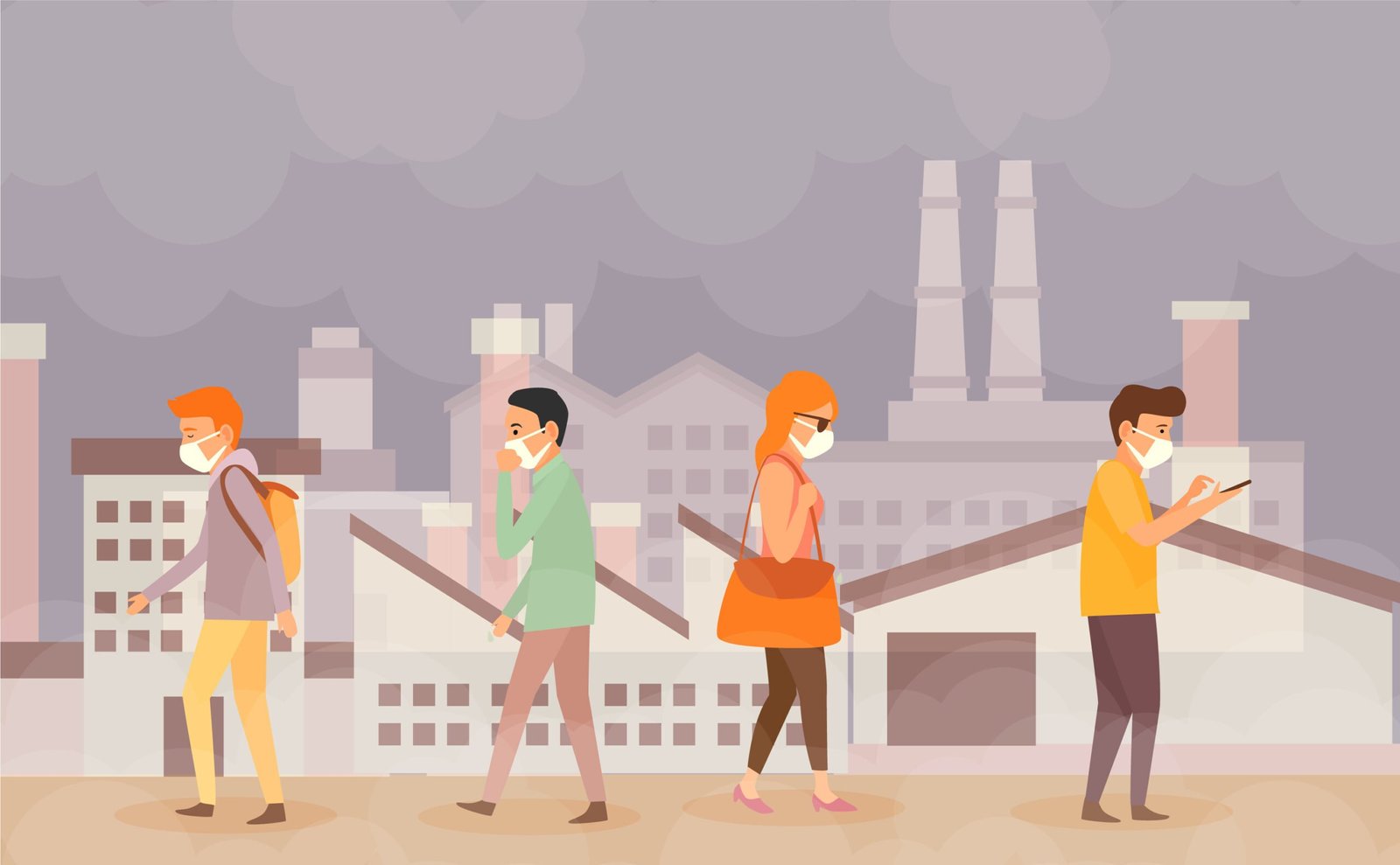Air Pollution in India and the troubling reality of its Impact & advocating for its Prevention.

The air we inhale is a precious resource that is sometimes disregarded in a society where almost every component of life is painstakingly measured and quantified, including the cost of things to the worth of time. The intangible quality of clean air is often taken for granted in the setting of a materialistic culture where value is typically linked with physical possessions. Unwillingly, the unrelenting quest of industrial advancement and financial success has contributed to an unsettling side effect: widespread environmental degradation. Because we live in a culture that values numbers, it is essential to carefully consider the “cost” of breathing contaminated air.
Natural, easy breathing is what everyone seeks. But given the geological situation we find ourselves in, the air is growing more and more poisonous, with adverse impacts on mental health, sexual health, as well as lifestyle. This has resulted in far-reaching and complex societal implications.
Based on data from the World Health Organization (WHO), air pollution poses an alarming threat to ecological wellness and is responsible for around 42 lakh avoidable fatalities annually. According to WHO recommendations, unhealthy air quality is caused by PM2.5, PM10, ozone, nitrogen dioxide, sulfur dioxide, as well as carbon monoxide (CO). PM2.5 is the most compelling evidence of detrimental health effects. These particles can cause oxidative stress and localized and systemic inflammation when they get to the deepest regions of the lung. They make their way into the brain as well. The final say on matters of their physical and mental well-being rests with all of them.
Air Pollution in India and its “Mental Health” impacts. How it Can Mess with Your Mind
Let’s talk about something that’s not so easy to see but can have a big impact on your well-being: air pollution. Sure, we know it’s bad for our lungs and the environment, but did you know it can also mess with your mind? Yep, you heard that right. Air pollution isn’t just harmful to the air we breathe; it can also take a toll on our mental health. Let’s dive into how that happens.

First off, what exactly is air pollution? It’s basically a mix of harmful particles and gases in the air, like smoke from factories, exhaust fumes from cars, and even dust and pollen. When we breathe in this polluted air, it can wreak havoc on our bodies, including our brains.
One of the biggest ways air pollution affects our mental health is by messing with our mood. Studies have shown that people who live in areas with high levels of air pollution are more likely to experience symptoms of depression and anxiety. Imagine feeling down or stressed out for no apparent reason – it could be because of the dirty air you’re breathing in every day.
But it doesn’t stop there. Air pollution can also impair our cognitive function, which is just a fancy way of saying it messes with our ability to think, learn, and remember stuff. Think about trying to focus on a task or remember important information when your brain feels like it’s in a fog – not fun, right? That’s what air pollution can do to our cognitive abilities.
And if you think you’re safe from the harmful effects of air pollution just because you spend most of your time indoors, think again. Indoor air pollution can be just as bad as outdoor air pollution, especially if you’re spending a lot of time in buildings with poor ventilation, like offices/schools.
So, what can we do to protect ourselves from the mental health effects of air pollution? Surely, we can advocate for cleaner air policies in our communities and support initiatives that aim to reduce pollution from cars, factories, and other sources. We can also take steps to reduce our own carbon footprint by driving less, using public transportation, and conserving energy at home.
When it comes to indoor air pollution, we can make sure our living and workspaces are well-ventilated and free from things like mold, dust, and chemicals that can pollute the air indoors.
Ultimately, maintaining our mental well-being is as crucial to maintaining our physical well-being. And when it comes to air pollution, the two go hand in hand. So let’s do our part to clean up the air we breathe – our minds will thank us for it!
How Air Pollution Can Mess with Your Love Life
Further, let’s chat about something that might seem a bit unexpected: air pollution and its sneaky effects on your love life. Yep, you heard that right – the stuff floating around in the air can actually throw a wrench in your romantic plans. So, let’s have a heart-to-heart about how air pollution isn’t just bad for the planet, but can also put a damper on your time between the sheets.

Picture this- you’re trying to get in the mood for a romantic evening with your partner, but instead of feeling the love, you’re feeling, well, not much of anything. That’s because certain pollutants can mess with your hormones, which can lead to issues like low libido and difficulties in getting things going in the bedroom. Is that not precisely the mood you’ve been striving for?
But wait, there’s more. Air pollution can also throw a wrench in your plans for starting a family. Studies showed that people who live in areas with high levels of air pollution might have a harder time getting pregnant. It’s like the pollution is standing in the way of your dreams of becoming parents.
And here’s the kicker – it’s not just the outdoor air that’s causing trouble. Even more severe than outdoor contamination of the air can occur indoors. Think about all the chemicals and toxins hiding out in your home, from cleaning products to air fresheners. Breathing in that stuff day in and day out can really mess with your romantic vibes.
So, what can we do to keep the romance alive in the face of air pollution? Well, for starters, we can take steps to clean up our indoor air by using natural cleaning products, ditching air fresheners, and keeping our living spaces well-ventilated. Plant purifying plants like Spider plant, Aloe vera, Money plant, etc.
And when it comes to getting cozy with your partner, remember to take care of yourselves. Eat well, exercise, and find healthy ways to manage stress. Because when you’re feeling good, your love life is sure to follow suit!
- Stay Informed: Keep track of air quality levels in your area through reliable sources and avoid outdoor activities during peak pollution times. Check AQI to stay less than 100.
- Reduce Exposure: Limit time spent in highly polluted areas, especially during heavy traffic or near industrial sites.
- Use Protection: Wear masks that filter out pollutants when necessary, especially during outdoor exercise or in areas with poor air quality.
- Improve Indoor Air: Keep indoor spaces well-ventilated and consider using air purifiers to reduce indoor pollution levels. Consume green leafy veggies that help in detoxification of mind and body. Exercise regularly in a clean environment.
- Support Clean Initiatives: Advocate for policies that reduce air pollution, viz. promoting clean energy and reducing vehicle emissions.
